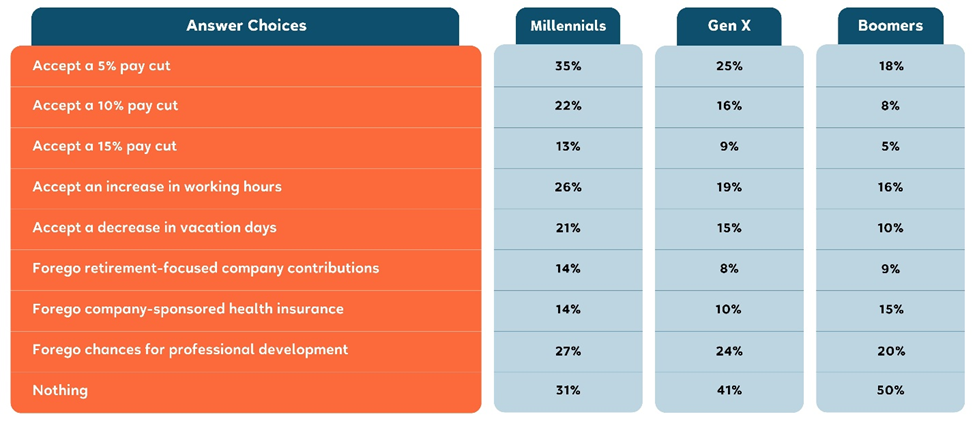FlexJobs, a career services firm specializing in remote and hybrid jobs, is out with another of its regular surveys on American attitudes towards job flexibility. Consistent with our own surveys, which found Americans valued flexibility on the job above all other factors, including pay, the new FlexJobs data takes the analysis a step or two further.
It appears that for substantial numbers of workers, in some cases as many as half, would be willing to consider surrendering a number of different benefits in exchange for the opportunity to have a “work from anywhere” job. Among millennials, over half would accept either a 5 percent or 10 percent pay cut to have such an option. Twenty-six percent would work longer hours and 21 percent would sacrifice some paid leave.

Source: FlexJobs
Amongst all age groups, 80 percent would consider moving to either a new city or state to secure a work-from-anywhere position while significant numbers of workers would give up professional development (23 percent), health insurance (13 percent), and retirement contributions (10 percent).
Of further interest is the way different age cohorts responded. Half of all Boomers said they wouldn’t be willing to give up anything in exchange for a fully remote job compared to 31 percent of Millenials. This divergence may have something to do with the fact that older workers already have the greatest access to flexible work arrangements while such jobs are often beyond reach for those with less seniority. Older workers also say no to increasing working hours, cutting vaction days, and giving up retirement contributions in exchange for fully remote jobs.
There’s one puzzle here. In our surveys, we found that younger workers, while greatly valuing flexibility, were less likely to rank remote work as a top priority (12 percent) over pay (25 percent). At the same time, 35 percent ranked flexibility as their top priority. Based on follow-up interviews with our survey participants, we discovered that flexibility for younger means being able to combine work with other priorities (education, caring for family) and activities (hobbies and personal health). It appears that responses depend a good deal on how questions get asked. Work-from-anywhere is a cousin of flexibility but a somewhat distant one.
One thing is for certain, no matter how hard CEOs press for a return to office, Americans continue to value emploment that allows them to mix-and-match work and personal life and are likely to continue pressing for it as part of their overall job packages.